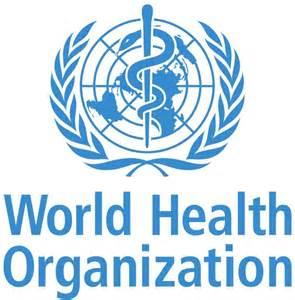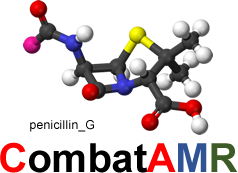 >WATCH: Bacteria Invade Antibiotics And Transform Into Superbugs
>WATCH: Bacteria Invade Antibiotics And Transform Into Superbugs
https://www.npr.org/sections/health-shots/2016/09/08/492965889/watch-bacteria-invade-antibiotics-and-transform-into-superbugs?t=1536795142578
September 8, 20162:02 PM ET. Angus Chen.Harvard Medical School - NPR.
If you've ever wanted to watch a superbug evolve before your very eyes, you're in luck. Researchers filmed an experiment that created bacteria a thousand times more drug-resistant than their ancestors. In the time-lapse video, a white bacterial colony creeps across an enormous black petri dish plated with vertical bands of successively higher doses of antibiotic.
The colony pauses when it hits the first band of antibiotic, creating a stark border between the white colony and the black petri dish. Then the bacteria start to edge their way into the toxic soup. More dots appear and they start growing, racing to the next, stronger band of antibiotic. The bacteria are evolving. After almost two weeks of real time have passed, they've become resistant to the strongest antibiotic and completely taken over the kitchen-table-sized petri dish. We know dangerous bacteria are getting stronger all the time and that it's our fault because of our excessive and indiscriminate use of antibiotics.
>Antibiotic Resistance: A Public Health Crisis | Victoria J. Fraser, MD | TEDxStLouisWomen
https://www.youtube.com/watch?v=p8QLvHtipJo
Bacteria develop resistance to the antibiotics because of improper dosage and unnecessary usage. Dr. Fraser currently focuses her research on preventing and controlling hospital-acquired infections, adverse events and medical errors. Here she explains how antibiotic resistance has become a public health crisis. Victoria J. Fraser is the Adolphus Busch Professor of Medicine, chair of the Department of Medicine at Washington University School of Medicine and physician-in-chief for Barnes-Jewish Hospital.
>Fighting Superbugs in India
Antimicrobial Resistance crisis- An Indian perspective.
How does antibiotic resistance affect the world and what can we do about it?
The Longitude Prize and BIRAC are proud to bring you this short film, following stories from India where antibiotic resistance is growing at a rapid rate. Interviews with doctors, patients and researchers all highlight the urgency of the problem. We also spoke with teams competing for the Longitude Prize to make rapid diagnostic tests that will help address the spread of superbugs in India and globally.

>Global Action Plan on Antimicrobial Resistance - message from WHO Director-General 18.07.18
Countries are making significant steps in tackling antimicrobial resistance (AMR), but serious gaps remain and require urgent action, according to a report released today by the UN Food and Agriculture Organization (FAO), World Organisation for Animal Health (OIE) and the World Health Organization (WHO). The report charts progress in 154 countries and reveals wide discrepancies.
http://www.who.int/news-room/detail/18-07-2018-countries-step-up-to-tackle-antimicrobial-resistance
>Maryn McKenna: What do we do when antibiotics don't work any more?
https://www.youtube.com/watch?v=o3oDpCb7VqI
Published on 25 Jun 2015
Penicillin changed everything. Infections that had previously killed were suddenly quickly curable. Yet as Maryn McKenna shares in this sobering talk, we've squandered the advantages afforded us by that and later antibiotics. Drug-resistant bacteria mean we're entering a post-antibiotic world — and it won't be pretty. There are, however, things we can do ... if we start right now.
>Ramanan Laxminarayan: The coming crisis in antibiotics
https://www.ted.com/talks/ramanan_laxminarayan_the_coming_crisis_in_antibiotics/up-next?language=en
Published on 10 Nov 2014. Antibiotic drugs save lives. But we simply use them too much — and often for non-lifesaving purposes, like treating the flu and even raising cheaper chickens. The result, says researcher Ramanan Laxminarayan, is that the drugs will stop working for everyone, as the bacteria they target grow more and more resistant. He calls on all of us (patients and doctors alike) to think of antibiotics — and their ongoing effectiveness — as a finite resource, and to think twice before we tap into it.
>Rise of the Superbug - Antibiotic-Resistant Bacteria: Dr. Karl Klose at TEDxSanAntonio
Published on 26 Jan 2013. As founder and director of the South Texas Center for Emerging Infectious Diseases, with 19 infectious disease laboratories, Dr. Klose's research focuses on understanding bacterial pathogenesis in order to develop effective vaccines and therapeutics. The Superbug does exist. Dr. Klose offers profiles of bacteria and their sinister ways of evolving into antibiotic-resistant menaces. A cleverly designed slideshow accompanies Dr. Klose. 'No more meat treated with antibiotics' might be your take-away mantra.
>Factory farms, antibiotics and superbugs: Lance Price at TEDxManhattan
Published on 11 Mar 2014
Antibiotics are being used to compensate for the overcrowded, stressful conditions on industrial farms and that's creating superbugs that threaten public health. Dr. Price uses cutting-edge DNA sequencing to trace the origins of new antibiotic-resistant pathogens. By analyzing the genomes of bacteria found in humans, food, and livestock and have traced the origins of new superbugs to industrial livestock production.
Dr. Price's work was selected by Discover Magazine as one of the top 100 science stories of 2012.
>What's bugging us? Antibiotic resistant bacteria! Karl Klose at TEDxSanAntonio 2013
https://www.youtube.com/watch?v=cviY_VPg6zo
Antibiotics are miracle drugs that have saved millions of lives from bacterial infections. But bacteria have become increasingly resistant to antibiotics. We are now running out of drugs to treat common infections. Understanding how bacteria cause disease, how antibiotics work, and how bacteria become resistant to these drugs is critical in the fight against infectious diseases. Bacteria are amazing organisms that have a variety of strategies to cause disease, but most bacterial diseases can be treated effectively with antibiotics. Yet bacteria can rapidly convert to become antibiotic resistant when they are in the constant presence of antibiotics, such as in hospitals. If the fight against bacterial infections is viewed as a war against an ever-changing foe, the best strategy is to constantly develop new "weapons". Robust and innovative research to discover new antibiotics, in addition to careful use of existing antibiotics, will help us maintain the upper hand in the fight against microbes.
>Bacterial World:Microbes that rule our world.
They are on the ocean surface and in the abyss, in soil and plants, not to mention the intestines of insects and large mammals, including humans.
They are bacteria, and they are present in every corner of our planet.
Are we aware that among the billions of bacteria that exist on earth, less than 1% of them are pathogenic?
http://www.cinefete.ca/en/site/produc
>How Two Microbes Changed History
What if I told you that, more than two billion years ago, some tiny living thing started to live inside another living thing … and never left?
And now, the descendants of both of those things are in you?
Produced in collaboration with PBS Digital Studios:
http://youtube.com/pbsdigitalstudios
>Good Germs; Bad Germs
https://www.socsci.ox.ac.uk/research/videos/good-germs-bad-germs
Invisible to the naked eye, yet a constant presence, microbes ('germs') live in, on and around us. The researchers in this project collaborate with members of the public to explore and experiment on the microbial life in their kitchens (and in one instance - a cat) and starts to unpick what we really mean by 'clean' and 'dirty'. This film is part of the Social Sciences: Bright Ideas series. You can watch more videos about Social Sciences research and impact at: www.socsci.ox.ac.uk/research/videos.
>The Microbiome
How Bacteria Rule Over Your Body – The Microbiome YouTube - 4 Aug 2017
Interesting and informative video sponsored by Bill & Belinda Gates Foundation. What happens when microbes talk to your brain? There is growing interest in our relationship with our microbiomes and this is attracting considerable funding.
Kurzgesagt Newsletter: http://eepurl.com/cRUQxz
Support us on Patreon so we can make more videos (and get cool stuff in return):
https://www.patreon.com/Kurzgesagt?ty=h
>How our microbes make us who we are
TED2014. https://www.ted.com/talks/rob_knight_how_our_microbes_make_us_who_we_are
Rob Knight, microbial ecologist, is a pioneer in studying human microbes, the community of tiny single-cell organisms living inside our bodies that have a huge — and largely unexplored — role in our health.
"The three pounds of microbes that you carry around with you might be more important than every single gene you carry around in your genome," he says. Find out why.
![]() NB: View more videos and more information about important developments in phage therapy
NB: View more videos and more information about important developments in phage therapy
>Videos 2016: World Health Organisation (WHO) - World Health and Social Good Show
Antimicrobial resistance is the topic of one of three World Health +Social Good shows being broadcast live on 24-26 May 2016. The shows are produced by WHO in collaboration with the UN Foundation during the World Health Assembly in Geneva.
>WHO: Antimicrobial resistance - Part 1 of World Health+Social Good 2016
On 24 May 2016, during a World Health +Social Good show, Dr Keiji Fukuda, Special Representative for Antimicrobial Resistance at the World Health Organization, explains antimicrobial resistance, and what it means for public health.
>WHO: Antimicrobial resistance - Part 3 of World Health+Social Good 2016
https://youtu.be/kOiFAhlcCI0
Precious Matsoso, Director-General of the Department of Health of South Africa, and Dr Poonam Khetrapal Singh, WHO Regional Director for South-East Asia, explain how South Africa and South-East Asia respectively are tackling antimicrobial resistance.
>WHO: Antimicrobial resistance - Part 4 of World Health+Social Good
https://www.youtube.com/watch?v=mdE8yl4yN3w&list=PL9S6xGsoqIBXPfTZqNe9H1QMVYQKENUxh&index=12&t=0s
On 24 May 2016, during a World Health +Social Good show, Dr Peter Beyer, of the Department of Essential Medicines and Health Products at the World Health Organization, talks about research and development for new antibiotics.

